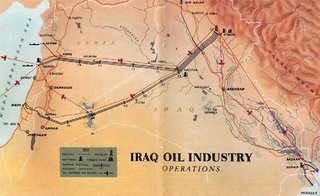Monday, July 17, 2006
Corruption Rampant In Iraq's Oil Industry

The United States is calling attention to widespread corruption in Iraq's oil industry.
U.S. Comptroller General David M. Walker told Congress last week that "massive corruption" and "a lot of theft going on" in Iraq's government-controlled oil industry is hampering the country's ability to govern itself. (...)
Walker, who heads the Government Accountability Office, made his remarks at a House Government Reform subcommittee meeting last Tuesday called to examine implementation of the Bush administration's 2005 "National Strategy for Victory in Iraq." He said one of the failures of the U.S. program was related to the prewar assumption that Iraq would be able to pay for its reconstruction "in large part through oil revenues."
He said about 10 percent of Iraq's refined fuels and 30 percent of its imported fuels are being stolen. (...)
Another GAO official, Joseph Christoff, director of international affairs and trade, pointed out that the Iraqi budget is paying for "what some could contend to be a bloated bureaucracy, primarily because oftentimes you don't know who is working in the different ministries -- there are ghost employees." (...)
(James Jeffrey of the State Department's Bureau of Near Eastern Affairs) said the reconstruction program, which involved the Defense Department, the State Department and the Agency for International Development, was, at $21.9 billion, "the largest . . . since the Marshall Plan." He said that prewar assumptions that "there would be a permissive security environment that would allow reconstruction to go forward" turned out to be wrong along with the estimate "that the Iraqi government would make important contributions to the reconstruction effort." (...)
But "without security," he said, "you really can't do anything or enough on the political and economic tracks. However . . . the solution to the security situation is not military but political." (...)
The report concludes that neither the Defense Department nor Congress "can reliably determine the costs of the war, nor do they have details on how appropriated funds are being spent or historical data useful in considering future funding needs." (...)
The Congressional Budget Office last week released its estimate of potential spending requirements for Iraq in the fiscal years 2007 to 2016 based on scenarios where there was either a rapid or slow drawdown of U.S. forces. In the case of rapid withdrawal -- troops out by 2009 -- the CBO estimated an additional $166 billion would be needed for military operations, on top of $290 billion already allocated. For a slower withdrawal, where 40,000 troops stay through 2016, it would cost $368 billion, said the CBO.


